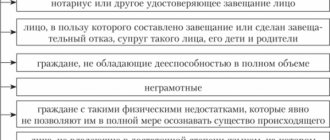Author of the article: Lina Smirnova Last modified: January 2021 2274
The legislation sets out in detail all the intricacies of inheriting property under a will. However, the codes do not formulate a precise definition of this term. If you look at the interpretation in the legal literature, a will is a transaction. By making it, the testator determines the order of distribution of property between the people whom he names as his heirs.
A transaction is the actions of certain persons aimed at establishing or completing any of their rights and obligations. And the citizen wants to intentionally and unilaterally transfer the rights to own his property (but only after his death) to other persons. He can do this in only one way - by drawing up a will, which will create rights and obligations immediately after his death and the subsequent opening of the inheritance.
Requirements for a will as a transaction
Any documents that are not specifically defined by law can be classified by type, and from a legal point of view, a will should be considered a transaction, and a unilateral one at that. Its simplest definition is that the will of one citizen (documented, of course) is enough to accomplish it.
Conditions that must be met for the transaction to take place:
- It is concluded unilaterally, and this is enough for the document to acquire legal force (clause 5 of Article 1118 of the Civil Code).
- The conclusion does not require the presence or consent of the second party, as well as for amendment or cancellation. The heirs have the right to accept or reject the inheritance; this is a secondary matter. A will of property does not provide for an agreement between two parties, so the actions of the heirs will also be carried out unilaterally.
- It is drawn up in writing and officially certified, i.e. has legal force.
- Done personally by the owner of the property. In any case, personal participation is required; the law does not provide for situations where representatives or proxies of the testator have the right to conclude this transaction without his presence. Also, a document can contain the will of only one person (clause 4 of Article 1118 of the Civil Code).
- The transaction, although urgent, does not have a specific time limit, but will still be executed. It is not correct to classify it as a conditional transaction (when it is unknown whether it will be executed). Cancellation or modification of an act are additional actions that do not change the essence. Until the time comes to open a will, the rights and obligations for the testator do not arise.
Even if circumstances arise that limit the testator’s legal capacity, the document drawn up before their occurrence will still retain legal force. Property acquired after the drafting of the will is also inherited according to its terms, if the wording allows this.
A will may contain certain conditions. For example, the opportunity to use property when the heir reaches a certain age. Or transfer of part of the inherited property to a certain third party.
However, to recognize such a transaction as valid and not subject to challenge, a clear statement of conditions is required that does not allow for ambiguity or absurdity. Otherwise, part of the terms of the will will be annulled in court. A citizen can provide that the appointed heir may refuse the transaction, or die earlier, or will be deprived of inheritance by law (Article 1117 of the Civil Code), and appoint a sub-heir (i.e. the second, following the first).
Expert commentary
Potapova Svetlana
Lawyer
A controversial feature of a will is that its effect extends only to property available at the time of opening and mentioned in the text of the document. The composition of what is inherited can change significantly. That is, if a citizen bequeathed an apartment and sold it before his death, then this property, of course, will not be inherited. However, this will not in any way affect the execution of other clauses of the act. If, on the contrary, something is discovered that is not specified in the will, then the distribution occurs in accordance with the provisions of the law.
The heir does not have any obligations during the life of the testator; this act is completely gratuitous.









